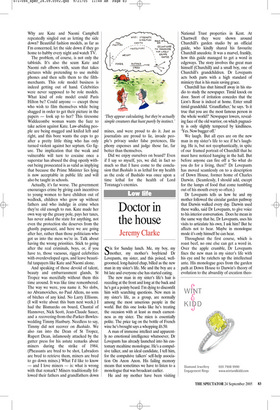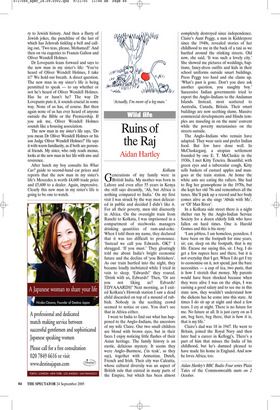Doctor in the house
Jeremy Clarke
Six for Sunday lunch. Me, my boy, my mother, my mother’s boyfriend Dr Lovepants, my sister, and this poised, wellgroomed, long-haired chap, billed as the new man in my sister’s life. Me and the boy are a bit late and everyone else has started eating.
The new man in my sister’s life’s hair is receding at the front and long at the back and he’s got a pointy beard. I’m dying to discomfit him with searching questions. New men in my sister’s life, as a group, are normally among the most unserious people in the world. But this one looks like he’s treating the occasion with at least as much earnestness as my sister. The mien is essentially polite. The price tag on the bottle of French wine he’s brought says a whopping £6.50.
A man of immense intellect and apparently no emotional intelligence whatsoever, Dr Lovepants has already launched into his customary mealtime monologue. He’s a compulsive talker, and an ideal candidate, I tell him, for the compulsive talkers’ self-help association On Anon Anon. His failing memory means that sometimes we have to listen to a monologue that was broadcast earlier.
He and my mother have been visiting National Trust properties in Kent. At Chartwell they were shown around Churchill’s garden studio by an official guide, who kindly shared his favourite Churchill anecdote. It was a marvel, frankly, how this guide managed to get a word in edgeways. The story involves the great man himself (Churchill) and a small boy, one of Churchill’s grandchildren. Dr Lovepants acts both parts with a high standard of mimicry that is his main saving grace.
Churchill has shut himself away in his studio to study the newspaper. Timid knock on door. Snort of irritation concedes that the Lion’s Roar is indeed at home. Enter small timid grandchild. ‘Grandfather,’ he says. ‘Is it true that you are the most famous person in the whole world?’ Newspaper lowers, revealing face of the old warrior, on which pugnacity is only slightly tempered by kindliness. ‘Yes. Now bugger off.’ We laugh. But all eyes are on the new man in my sister’s life to see if he’s laughing. He is, but not sycophantically, in spite of our framed portrait of Churchill that he must have noticed hanging in the hall. But before anyone can fire off a ‘So what do you do for a living, then?’ Dr Lovepants has moved seamlessly on to a description of Down House, former home of Charles Darwin. (Seamlessly, I should add, except for the lumps of food that come tumbling out of his mouth every so often.) Dr Lovepants tells us how he and my mother followed the circular garden pathway that Darwin walked every day. Darwin used these walks, said Dr Lovepants, to give voice to his interior conversation. Does he mean in the same way that he, Dr Lovepants, uses his visits to articulate his own, I ask him? But he affects not to hear. Maybe in monologue mode it’s only himself he can hear.
Throughout the first course, which is roast beef, no one else can get a word in. Over the apple crumble, Dr Lovepants fixes the new man in my sister’s life with his eye and he ratchets up the intellectual ante. His monologue goes from the garden path at Down House to Darwin’s theory of evolution to the absurdity of creation theo ry to Jewish history. And then a flurry of Jewish jokes, the punchline of the last of which has Jehovah tinkling a bell and calling out, ‘Two teas, please, Mohamed!’ And then on via eugenics to Francis Galton and Oliver Wendell Holmes.
Dr Lovepants leans forward and says to the new man in my sister’s life: ‘You’ve heard of Oliver Wendell Holmes, I take it?’ We hold our breath. A direct question. The new man in my sister’s life is being permitted to speak — to say whether or not he’s heard of Oliver Wendell Holmes. Has he or hasn’t he? The way Dr Lovepants puts it, it sounds crucial in some way. None of us has, of course. But then again none of us has ever heard of anyone outside the Bible or the Premiership. If you ask me, Oliver Wendell Holmes sounds like a housing association.
The new man in my sister’s life says, ‘Do you mean Dr Oliver Wendell Holmes or his son Judge Oliver Wendell Holmes?’ He says it with warm familiarity, as if both are personal friends. My sister, who only reads menus, looks at the new man in her life with awe and reverence.
After lunch my boy consults his What Car? guide to second-hand car prices and reports that the new man in my sister’s life’s Mercedes is worth £4,600 trade price and £5,600 to a dealer. Again, impressive. Clearly this new man in my sister’s life is going to be one to watch.

































































 Previous page
Previous page